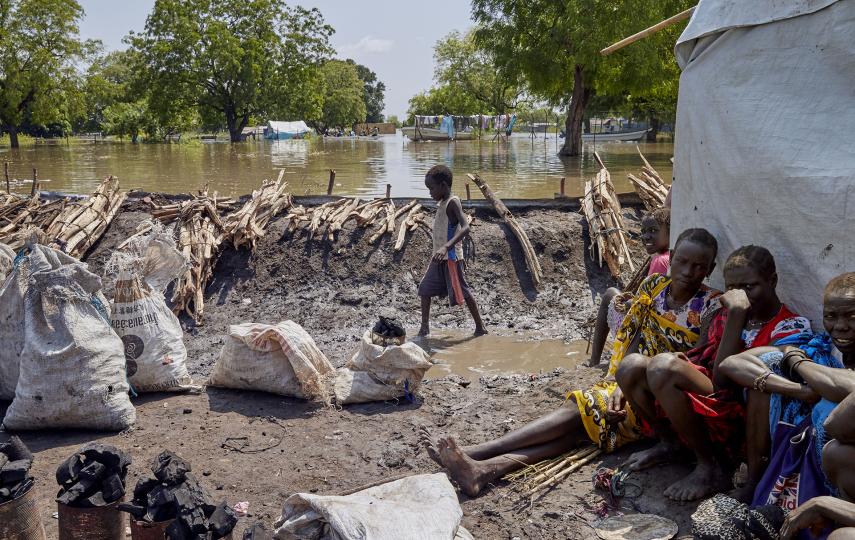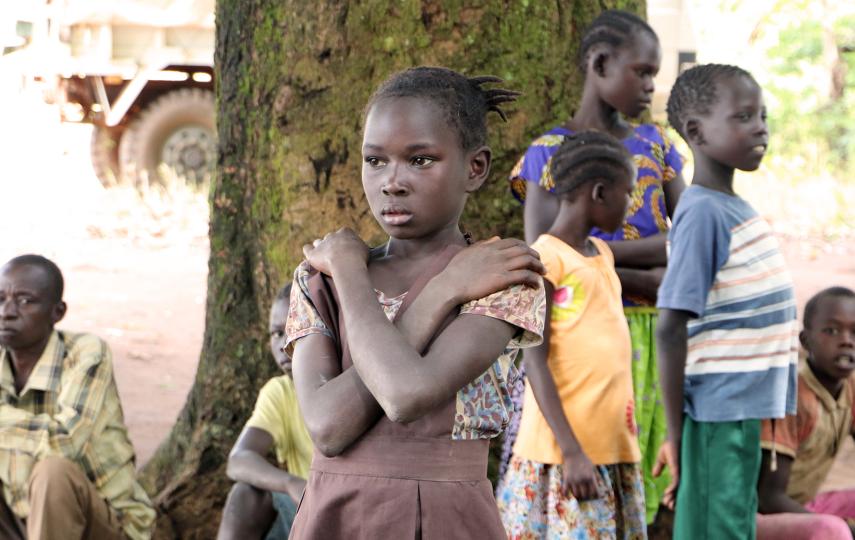On the streets of South Sudan’s capital city, billboards honour the country’s politicians for ending five years of conflict that cost almost 400,000 lives and displaced millions. “Peacemakers” and “Children of God” declares one poster, quoting the Bible alongside a photo of the president.
But nearly a year after President Salva Kiir formed a unity government with opposition leader Riek Machar – now the vice-president – key parts of the agreement have not been implemented amid entrenched distrust between the two men, funding shortages, and renewed fighting that cost thousands of lives in 2020.

Nyadid Racho from western Pibor – where famine is thought to be occurring – says she has seen little benefit from the deal. The 40-year-old told The New Humanitarian ongoing clashes between community militias cost the lives of two of her children last year – both starved to death within days of each other.
“If we hadn’t been attacked, and if our cattle were not taken, my children would still be alive,” Racho said.
Many South Sudanese who spoke to TNH on a visit to the country in December questioned the political will for peace, while analysts fear disenchantment within Machar’s camp over the slow progress could soon fuel new outbreaks of violence.
“As various parts of the peace deal stall, the risk is rising that some opposition forces could return to conflict or try to sue for peace on their own terms,” said Alan Boswell, a South Sudan analyst with the International Crisis Group.
The current agreement is the second between Kiir and Machar since civil war broke out in 2013 – two years after South Sudan gained independence from Sudan. The collapse of the last deal, in 2016, resulted in widespread violence in the capital, Juba, as Machar fled South Sudan on foot.
While fighting between forces loyal to the two men has largely subsided over the past 12 months, inter-communal violence – stirred by political elites in Juba – has displaced thousands in places like Pibor.
Deadly clashes have also broken out between government troops and dissident rebel groups who have refused to join the power-sharing deal, which was signed in September 2018.
Insufficient funding for the agreement is further complicating efforts. Dozens of mostly opposition troops have starved to death in cantonment and training sites as they wait to join a new national army, while peace deal officials in Juba have been chased from hotels because the government isn’t paying their bills – $10 million is owed to nine hotels.
As the agreement stagnates, a humanitarian crisis is worsening. Deadly violence, torrential rains, and a contracting economy have left more than 100,000 people facing “phase five” catastrophic levels of hunger, and tens of thousands experiencing likely famine conditions, according to a November report published by the Integrated Food Security Phase Classification (IPC).
Die-hard resentments
Machar and Kiir shook hands and hugged last year when they agreed to work together. But trust runs thin between the old foes who have been squabbling over appointments for political positions – leaving most state and county posts unfilled and a new parliament yet to be established.
In some cases, delays in appointing governors for the country’s 10 states have resulted in dangerous political vacuums. Though nine governor positions have now been confirmed, controversy lingers in the northeastern state of Upper Nile, where Kiir is resisting Machar’s choice of Johnson Olony – a man accused of committing war crimes.
Goanar Gordon Yien, a press secretary for Machar, told TNH that Kiir’s regime is trying to undermine the peace agreement by co-opting opposition military officials with expensive cars, money, and weapons.

Several high-ranking soldiers have indeed defected from Machar’s camp in recent months – in some cases triggering fighting between government and opposition forces that has cost lives and damaged property.
“If we have money, let us use it to implement the peace,” said Yien. “[The government is] not using it for good things, they’re using it to destroy the peace agreement.”
The government did not respond to repeated requests by TNH for comment, though acting army spokesman Santo Domic Chol said the administration is committed to peace and is not bribing opposition forces.
Machar has also incurred criticism from members of his own party. Some question his commitment to the peace agreement, as well as his appointment of friends and family to key positions in the unity government. Others say he is neglecting constituents and troops in the countryside, having not left Juba in almost a year.
Many South Sudanese blame both men for the enduring crisis. A recently published report from the country’s National Dialogue Steering Committee, an initiative that gathered the views of tens of thousands of ordinary people, called for the two politicians to resign ahead of elections scheduled for 2023.
“They have… created an unbreakable political deadlock in the country, and they no longer have the political will or moral leadership capacity to move beyond personal grudges and egos,” the report stated.
Funding woes and starving soldiers
Speaking to TNH via WhatsApp, Stephen Par Kuol, secretary general for the National Transition Committee, the government body in charge of implementing the peace deal, blamed financial problems for the implementation challenges.
Falling oil prices – South Sudan’s main revenue source – and the economic fallout of the COVID-19 pandemic have left the government with “no funds as things stand now”, Kuol said.
While the international community has given in-kind aid – such as food for military cantonment sites – to support the peace process, South Sudan’s main foreign donors have shied away from directly financing the agreement.
Funding shortages are particularly acute at the cantonment sites, where tens of thousands of soldiers are waiting to enrol in a new, unified national army combining opposition and government forces.
The national army, a central component of the 2018 agreement, was supposed to be created within months. But the process has dragged out for more than a year and a half, with around 40,000 soldiers still untrained and 47,000 more awaiting graduation.

As of October, 77 soldiers participating in the process had starved to death in camps, according to Wesley Welebe, co-chair of the Joint Transitional Security Committee, the body charged with unifying and training the forces.
Welebe said a lack of food, adequate shelter, medicine, and water is pushing some soldiers to leave the camps and return to their villages. “When they go back and have nothing to do… they’ll mobilise the community and start something else,” he added.
Fighting on multiple fronts
As the agreement has faltered, violence has escalated in some parts of the country. In the western state of Jonglei and the administrative area of Pibor, more than 30,000 people are now likely in famine following months of heavy rain and militia clashes.
Fighting between government forces and the National Salvation Front – a rebel group that refused to sign the peace deal because its leader believes power is too concentrated in the hands of Kiir and Machar – has displaced thousands in southwestern Yei and surrounding areas.
Civilians from Yei say they are caught between both sides: One man from the area told TNH rebels abducted his uncle last year, while government troops who suspect them of supporting the group hinder free movement with “roadblocks and harassment”.
“If both sides don’t stop fighting, it will be a mess,” said the man, who asked not to be named for security reasons.
Violence is feared in other parts of the country too. In Upper Nile, some analysts said conflict linked to land tensions may break out between the Shilluk and the Padang Dinka should Olony – who is from the former ethnic group – be appointed governor.
“Olony could bring peace to the area, but his appointment could also trigger fresh violence if it’s not handled well by the government,” said Edmund Yakani, executive director of Community Empowerment for Progress Organization, a civil society group.

Little has been done, meanwhile, to unify soldiers who fought each other for years. In Pibor, government army commander Korok Nyal said 150 soldiers from the ethnic Murle group left a training site in nearby Bor town out of concern they would be targeted by troops from other ethnic groups. In the southern state of Central Equatoria, another commander told TNH his men have no contact at all with opposition soldiers.
Denial and diversion of aid
Despite peace deal signatories commiting to create an environment conducive to the delivery of aid, humanitarian flights have been blocked and hundreds of tonnes of food aid stolen in Pibor and Jonglei, where residents are most in need.
In a report in October, the UN Commission on Human Rights for South Sudan, said it had reasonable grounds to believe the denial and diversion of aid to people in Jonglei could amount to war crimes.
The government has also refused to endorse the findings of the IPC-published food security report. In December, it released its own version, which fails to mention famine and claims just 11,000 people are experiencing “catastrophic” hunger – a small fraction of the IPC number.
While the government protects its image, residents of Pibor continue to struggle. Hunger is rising, violence is expected to pick up as the dry season approaches, and hope in the peace agreement is increasingly difficult to find.
“It’s really hard to tell if there’s peace or not,” said 45-year-old Bongan Allan, whose five children were abducted during an outbreak of violence in February 2020. “We’re just staying here, as people take away our cattle and our children die of hunger.”
sm/pk/ag







